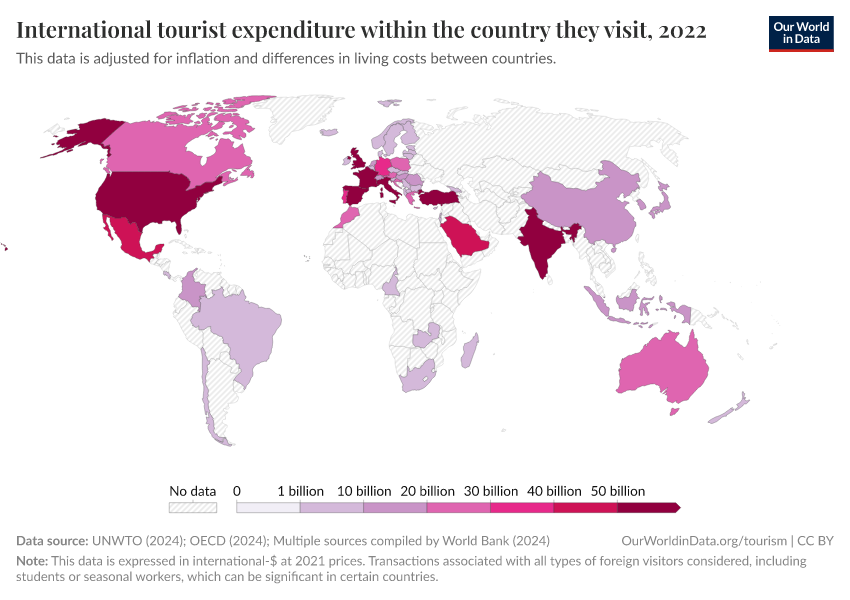International tourist expenditure within the country they visit

What you should know about this indicator
- Expenditures associated with international visitors are traditionally categorized under the travel item of the Balance of Payments (BOP). For inbound tourism, these expenses are recorded as "credits" in the BOP and referred to as "travel receipts".
- It's important to note that BOP estimates also include expenditures related to other types of travelers, such as long-term students, patients, border workers, and seasonal workers, which can be substantial in some countries.
- In the context of this specific indicator, adjustments have been made to account for inflation and differences in the cost of living in the destination countries where tourists spend their money.
- To achieve this, the expenditure data has been converted from US dollars to the local currency of each respective country.
- The inflation adjustment is based on the Consumer Price Index (CPI) for the year 2021 specific to each country.
- Finally, the data is expressed in international 2021 US dollars, enabling consistent and comparable analysis across different destinations and time periods.
- Following the adjustment, in countries where the cost of living is lower, the adjusted total expenditure will reflect a higher value.
- This indicates that tourist money holds greater purchasing power in terms of acquiring goods and services, allowing tourists to obtain more with their expenditures in these destinations.
What you should know about this indicator
- Expenditures associated with international visitors are traditionally categorized under the travel item of the Balance of Payments (BOP). For inbound tourism, these expenses are recorded as "credits" in the BOP and referred to as "travel receipts".
- It's important to note that BOP estimates also include expenditures related to other types of travelers, such as long-term students, patients, border workers, and seasonal workers, which can be substantial in some countries.
- In the context of this specific indicator, adjustments have been made to account for inflation and differences in the cost of living in the destination countries where tourists spend their money.
- To achieve this, the expenditure data has been converted from US dollars to the local currency of each respective country.
- The inflation adjustment is based on the Consumer Price Index (CPI) for the year 2021 specific to each country.
- Finally, the data is expressed in international 2021 US dollars, enabling consistent and comparable analysis across different destinations and time periods.
- Following the adjustment, in countries where the cost of living is lower, the adjusted total expenditure will reflect a higher value.
- This indicates that tourist money holds greater purchasing power in terms of acquiring goods and services, allowing tourists to obtain more with their expenditures in these destinations.
Sources and processing
This data is based on the following sources
How we process data at Our World in Data
All data and visualizations on Our World in Data rely on data sourced from one or several original data providers. Preparing this original data involves several processing steps. Depending on the data, this can include standardizing country names and world region definitions, converting units, calculating derived indicators such as per capita measures, as well as adding or adapting metadata such as the name or the description given to an indicator.
At the link below you can find a detailed description of the structure of our data pipeline, including links to all the code used to prepare data across Our World in Data.
Notes on our processing step for this indicator
The purchasing power parity (PPP) and consumer price index (CPI) are used to adjust the expenditure data for inflation and purchasing power differences. This adjustment allows for a more accurate comparison of expenditure data across different years and countries.
Reuse this work
- All data produced by third-party providers and made available by Our World in Data are subject to the license terms from the original providers. Our work would not be possible without the data providers we rely on, so we ask you to always cite them appropriately (see below). This is crucial to allow data providers to continue doing their work, enhancing, maintaining and updating valuable data.
- All data, visualizations, and code produced by Our World in Data are completely open access under the Creative Commons BY license. You have the permission to use, distribute, and reproduce these in any medium, provided the source and authors are credited.
Citations
How to cite this page
To cite this page overall, including any descriptions, FAQs or explanations of the data authored by Our World in Data, please use the following citation:
“Data Page: International tourist expenditure within the country they visit”, part of the following publication: Bastian Herre and Veronika Samborska (2023) - “Tourism”. Data adapted from UNWTO, OECD, International Monetary Fund (via World Bank). Retrieved from https://archive.ourworldindata.org/20250909-093708/grapher/average-expenditures-of-international-tourists-domestically.html [online resource] (archived on September 9, 2025).How to cite this data
In-line citationIf you have limited space (e.g. in data visualizations), you can use this abbreviated in-line citation:
UNWTO (2024); OECD (2024); Multiple sources compiled by World Bank (2024) – processed by Our World in DataFull citation
UNWTO (2024); OECD (2024); Multiple sources compiled by World Bank (2024) – processed by Our World in Data. “International tourist expenditure within the country they visit” [dataset]. UNWTO, “145 key tourism statistics”; OECD, “Annual Purchasing Power Parities and exchange rates”; International Monetary Fund (via World Bank), “World Development Indicators” [original data]. Retrieved December 20, 2025 from https://archive.ourworldindata.org/20250909-093708/grapher/average-expenditures-of-international-tourists-domestically.html (archived on September 9, 2025).